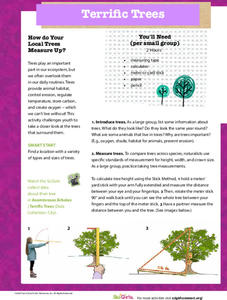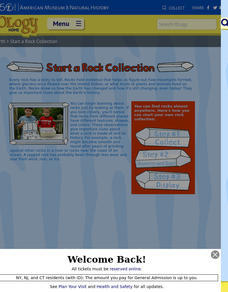Smarter Balanced
Classifying Vertebrates
What features do scientists use to classify animals into groups? Class groups examine a series of paired images of vertebrates (a bass and a trout, a toad and a newt, a crocodile and a tortoise, an owl and a robin, a tiger and a bear)...
New South Wales Department of Education
Invertebrates
Of all invertebrates, insects by far are the most numerous. Scholars discuss invertebrates and then use a key to classify them. They see different examples and must describe features of each organism based upon the key.
New South Wales Department of Education
Plant Features
Pine needles are actually modified leaves. In the 16th installment of 20, young scientists explore plants. Through an analysis of leaves — shape, veins, and edges — pupils see how to classify plants based on structural features.
South Gloucestershire Council
Animal Classification: A Collaborative Sorting Activity for Key Stages 2 & 3
Introduce the logic behind a dichotomous key or administer a group performance assessment with a fun and challenging classification lesson. With explicit instructions for the teacher and for collaborative groups, as well as engaging...
Nature New Brunswick
Habitat for Endangered Wildlife and You
Compare and contrast your habitat with that of endangered plants and animals! Learners discuss what a habitat is actually comprised of, describing what theirs looks like. They fill out a graphic organizer explaining what they eat, how...
Wild BC
Carbon - The Short and the Long
For this complex game about the carbon cycle, the playing field is divided into air, living, and earth zones. Children are assigned to be either plants or animals, and collect carbon tokens as they proceed from zone to zone. While the...
Howard Hughes Medical Institute
Modeling Food Webs in Darién, Panama
It's a jungle out there! Young biologists journey to Darien, Panama to examine the intricate relationships between the organisms that inhabit the jungle. Groups begin by demonstrating an understanding of energy flow in ecosystems, then...
Mr. Jones's Science Class
Periodic Table Project
Don't be fooled by the title; this is not really a lesson on elements. It is a project on classification, using the periodic table as an example. For that reason, it could be used in any branch of science. As an example, a group may...
Scholastic
Minibeasts
Lead young scientists to discover insects outdoors. After investigating, students will record observations, learn about these fascinating creatures, craft, and role play.
PBS
Terrific Trees
Engage in a shady activity to practice measurement techniques. Classes venture outside to collect measurements of various trees, using different strategies to measure the height, trunk circumference, width, and crown size. Then they...
American Museum of Natural History
Start a Rock Collection
Rocks hold evidence of Earth's past. A three-step guide describes the process of creating a rock collection. It provides a data collection sheet to make notes about each sample.
Read Works
Read Works: Animals Get Ready
[Free Registration/Login Required] Students read about how different types of animals prepare for winter. A question sheet is available to help students build skills in classifying and categorizing.
Science Buddies
Science Buddies: Finding Phyla
Animals come in all shapes and sizes, each a small part of the amazing diversity of life. These differences can also help us to classify animals into different groups. Which group do you belong to? Do this experiment to investigate the...
Sheppard Software
Sheppard Software: Parts of the Food Chain: Producers, Consumers, Decomposers
Learn how scientists classify different types of organisms in an ecosystem or in a food chain by their role and function as either a producer, a consumer, or a decomposer. Then play a game that tests your understanding of these important...













